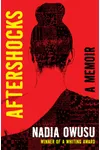Picture a Ghanaian-Armenian storyteller whose pen weaves tales of identity and resilience across continents—meet Nadia Owusu! Born in Tanzania and raised in a whirlwind of cultures, Owusu’s debut memoir, Aftershocks, has captivated readers with its raw, poetic exploration of trauma and belonging. Her unique voice, shaped by a nomadic childhood, makes her a literary star on the rise.
From Brooklyn’s vibrant streets, Owusu crafts narratives that resonate with anyone who’s ever felt caught between worlds. Her work, celebrated by the likes of The New York Times and Barack Obama, invites readers to embrace the beauty of their own complexities. Ready to dive into her story?
The Making of Nadia Owusu
Nadia Owusu was born on February 23, 1981, in Dar es Salaam, Tanzania, to a Ghanaian father, Osei Owusu, and an Armenian-American mother, Almas Janikian. Her father’s role with the United Nations meant a childhood on the move—Italy, Ethiopia, England, Ghana, Uganda, and Tanzania shaped her early years. This peripatetic life, coupled with her mother’s abandonment at age two and her father’s death from cancer at 13, left Owusu grappling with questions of home and identity. Inspired by her father’s poetry and Ashanti storytelling traditions, she began writing as a child, crafting illustrated stories that hinted at her future brilliance.
Owusu settled in New York at 18, earning degrees from Pace University, Hunter College, and the Mountainview MFA program. Her career as an urbanist, focusing on racial equity at organizations like Living Cities and Frontline Solutions, parallels her writing’s themes of belonging and justice. Her early essays, published in outlets like The New York Times and Granta, laid the groundwork for her literary ascent.
Nadia Owusu’s Unforgettable Stories
Owusu’s debut memoir, Aftershocks (2020), is a lyrical masterpiece that uses earthquakes as a metaphor for personal and generational trauma. The book traces her global upbringing, her mother’s absence, and her father’s loss, weaving in reflections on colonialism, anti-Blackness, and the Armenian genocide. Critics, including Vogue and TIME, hailed it as a best book of 2021, and it earned a 2019 Whiting Award for its manuscript. Its nonlinear structure and poetic prose capture the disorientation of a “third-culture kid” seeking roots.
Her chapbook, So Devilish a Fire (2017), a lyric essay that won The Atlas Review’s contest, showcases her ability to blend personal narrative with cultural critique. Published in magazines like The Paris Review Daily and The Guardian, Owusu’s essays explore grief, race, and belonging with unflinching honesty. She’s currently working on a novel that promises to delve deeper into identity and home, though details remain under wraps. Her style—raw, musical, and evocative—draws from influences like Toni Morrison and Audre Lorde, making her work both intimate and universal.
Owusu’s writing stands out for its emotional accessibility and rigorous interrogation of history. She doesn’t just tell her story; she invites readers to question their own narratives, making her a vital voice in contemporary nonfiction. Her teaching at Columbia University and the Mountainview MFA program further amplifies her influence, nurturing the next generation of writers.
Why Nadia Owusu Matters
Nadia Owusu’s work resonates in a world grappling with displacement and identity. Her memoir offers a roadmap for navigating cultural hybridity, resonating with diasporic communities and anyone who’s felt “between.” By confronting personal and collective traumas—colonization, genocide, anti-Blackness—she fosters compassion and understanding. Her urbanist work, advocating for equitable cities, mirrors her literary mission to create spaces where all belong. Owusu’s accolades, from the Whiting Award to Malala Yousafzai’s book club selection, underscore her growing impact.
As a Ghanaian-Armenian-American, Owusu bridges worlds, showing that home is not a place but a story we tell ourselves. Her voice empowers readers to embrace their own fault lines, turning cracks into sources of strength. She’s a beacon for those seeking to understand the beauty of a fractured world.
- Birth Date: February 23, 1981
- Key Works: Aftershocks, So Devilish a Fire
- Awards: 2019 Whiting Award, Robert J. Begeibing Prize
- Notable Fans: Barack Obama, Malala Yousafzai
Snag Aftershocks and dive into Nadia Owusu’s poetic, soul-stirring nonfiction! Her words will leave you inspired to explore your own story.
